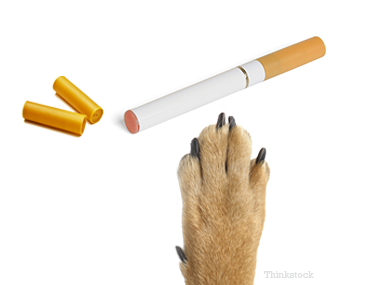
Recently, a puppy died after ingesting part of an electronic cigarette. While the story went viral on social media, the question that remains is just how poisonous are electronic cigarettes?
First, as a non-smoker, I love electronic cigarettes as there’s no second-hand smoke exposure to innocent bystanders (e.g., family members, dogs, and cats). That said, they still pose potential health risks to the smoker and to any pet that accidentally ingested them. Here, you can find more information about electronic cigarettes from the FDA.
What are electronic cigarettes?
Electronic cigarettes are battery-operated products that use a cartridge that contains a diluent (typically propylene glycol). The same diluent is found in “pet-safe” antifreeze and glycerin and also found in nicotine and flavoring agents. [Editor’s Note: Pet safe antifreeze is safer than other kinds, but it’s still poisonous. Seek medical care immediately if your pet has ingested antifreeze of any kind.]
Electronic cigarettes basically work by converting the nicotine solution into a vapor instead of a smoke so that the vapor can be inhaled by the user.
What are the dangers of electronic cigarettes for my dog?
The problem is that these cartridges can contain different amounts of nicotine ranging from 16 to 24 mg per cartridge. That said, electronic cigarettes are just as poisonous as regular cigarettes or cigars. The threat varies depending on how much nicotine is ingested.
How much nicotine is in various products? Table excerpted from Osweiler--Blackwell's Five-Minute Veterinary Consult Clinical Companion: Small Animal Toxicology
Nicotine-containing product | Average amount of nicotine (mg/g) | Average amount of nicotine per typical size or “unit” |
Unfiltered cigarettes | 11-30 | 12 mg per cigarette |
Filtered cigarettes | 7-30 | 11.8 mg per cigarette |
Cigars |
| 100-444 mg per cigar |
Chewing tobacco | 7-16 |
|
Nicotine patches |
| 7-114 mg per patch |
Nicotine gum |
| 2-4 mg per piece |
When it comes to poisoning, there are two potential concerns with electronic cigarettes: the amount of nicotine and the battery (which can cause corrosive injury depending on the type of battery).
Symptoms of nicotine poisoning in dogs
Depending on how much nicotine is ingested, severe poisoning can be seen in dogs. Clinical signs of nicotine poisoning can be seen within several minutes; they can last for 1-2 hours (in mild cases) or 18-24 hours (in severe cases).
Clinical signs seen with nicotine poisoning include:
- Drooling
- Vomiting
- Diarrhea
- Nervousness
- Agitation
- Weakness
- Dilated pupils
- Walking drunk
- An abnormal heart rate (typically an elevated heart rate, although a very slow heart rate can occasionally be seen secondary to high blood pressure)
- Hypertension
- Panting
- Arrhythmias
- Tremors
- Seizures
- Death
How often is nicotine fatal for dogs?
Unfortunately, it only takes a small amount of nicotine ingestion to result in canine poisoning. Clinical signs of poisoning can be seen after ingestion of even one cigarette–-whether it’s electronic or a regular unfiltered cigarette. 9-12 mg/kg of nicotine will kill 50% of dogs; it often depends on the size of the dog and the amount ingested.
Treatment for nicotine poisoning
Treatment includes appropriate decontamination (i.e., inducing vomiting and giving a dose of activated charcoal to bind the poison from the intestines), intravenous fluids to help hydrate the pet, anti-vomiting medication, anti-seizure medication, blood pressure medication, heart medications to stop the arrhythmias, sedation (to relieve the severe anxiety), and blood pressure or heart monitoring with an electrocardiogram.
Prevention of nicotine poisoning
When in doubt, make sure to keep anything containing nicotine out of reach. The most important thing to remember is that the sooner you identify that your pet is poisoned, the sooner (and less expensive) it is to treat. When in doubt, contact your veterinarian or ASPCA Animal Poison Control Center immediately for life-saving care.
If you have any questions or concerns, you should always visit or call your veterinarian -- they are your best resource to ensure the health and well-being of your pets.
